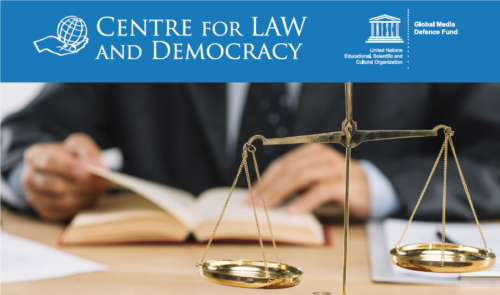
Supporting the Establishment of Networks of Media Lawyers Globally
The Centre for Law and Democracy (CLD), with funding from the Global Media Defence Fund managed by UNESCO, is providing support for the formation and development of national networks of media lawyers. Such networks bring together legal professionals who seek to protect media freedom and freedom of expression. They can serve as forums for professional collaboration, knowledge sharing, advocacy and capacity building.
If you are lawyer with expertise in media law, and are interested in joining or developing such a network, you can make use of the resources below or email info@law-democracy.org for more information.
Webinars
On 28 January 2025, CLD will be holding a webinar on international standards on hate speech. The webinar will run from 8:30 to 10:00 Eastern Time/14:30 to 16:00 Central European Time. An agenda for the webinar is available here. The webinar will feature presentations from CLD in three different areas:
-
- International standards for legal prohibitions of hate speech.
- Standards for professional media regulation of discriminatory speech.
- Emerging standards on addressing discriminatory speech online (from a senior consultant to UNESCO on digital policy)
You can register for this webinar at: https://us02web.zoom.us/meeting/register/qbpTNo2xRGWaQcxiFfnBvQ
 On 27 November 2024 at 8:30 Eastern Time/14:30 Central European Time, CLD held a 1.5 hour-long webinar titled “Introduction to Digital Rights and Platform Regulation”. The webinar featured presentations from CLD on international standards on digital rights and platform regulation, as well as a presentation from the co-director of El Veinte, a Colombian civil society organisation which has been active in digital rights litigation.
On 27 November 2024 at 8:30 Eastern Time/14:30 Central European Time, CLD held a 1.5 hour-long webinar titled “Introduction to Digital Rights and Platform Regulation”. The webinar featured presentations from CLD on international standards on digital rights and platform regulation, as well as a presentation from the co-director of El Veinte, a Colombian civil society organisation which has been active in digital rights litigation.
On 10 October 2024, CLD held a webinar, “Key Protections for Journalists and their Sources”. This provided an introduction to international freedom of expression standards which provide particular protection to journalists, with a focus on whistleblower protections, protection of sources and anti-SLAPP measures.
On 18 July 2024, CLD held a webinar, “Introduction to Creating a Media Lawyers’ Network”, which provided a general introduction to the concept of creating a national professional network of media lawyers, steps which can be taken to establish one and resources developed by CLD to support the formation of such networks.
For details about information provided at these webinars, or to join our email list for future webinars, contact us at info@law-democracy.org. You can also check this page for announcements about future webinars.
Resources
Project Brochures: Brochures describing the project and the concept of a media lawyers’ network are available in Arabic, English, French, Russian and Spanish (click on the appropriate language to download).
Background Note on Establishing a Media Lawyers’ Network: This Note provides an introduction to the role of media lawyers’ networks and outlines organisational issues for lawyers to consider when establishing a network, such as questions of governance, membership and funding. The Note is available in Arabic, English, French and Spanish.
Model Constitution: This Model Constitution can serve as an initial template for developing a constitution or articles of incorporation for a new media lawyers’ network. It is available in Arabic pdf and word, in English in pdf and word, in French in pdf and word and in Spanish in pdf and word.
Case Studies of Media Lawyers’ Networks: These case studies highlight the work of media lawyers’ networks in three different countries. They feature:
Guide on Using International Freedom of Expression Norms in Domestic Courts: This short but focused Guide aims to serve as a resource for lawyers seeking to use international legal standards relating to freedom of expression to enhance their domestic litigation. It is available in English, Spanish and French.
Model Training Materials: These training materials are designed as a resource for networks of media lawyers and other organisations which are working to build the capacity of lawyers to use international human rights standards, especially at the domestic level. The Materials consist of: 1) a Background Reading document describing in some detail the core standards; 2) sample exercises that can be used as part of training programmes; 3) discussion questions, again for training; and 4) sample agendas for a 1.5 hour or one-half-day workshop based on the materials.
-
-
Model Training Materials: Overview of Freedom of Expression under International Law: These materials provide a basic introduction to freedom of expression standards. They are available in English here.
-
Model Training Materials: Hate Speech, Defamation and National Security: These materials provide a more detailed discussion of three of the more complex freedom of expression topics. They are available in English here.
-



